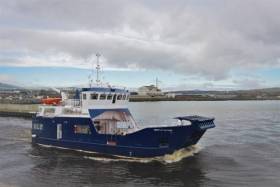Displaying items by tag: Rathlin ferry completed
#FerryCompleted - Spirit of Rathlin the new £2.8m car and passenger ferry is to be operated under a new ten year contract awarded to Rathlin Island Ferry Ltd, writes Jehan Ashmore.
The newbuild built by Arklow Marine Services undertook sea trials last year and is to replace an ageing ‘Island’ class ferry the Canna on the Ballycastle-Rathlin service. This former CalMac ferry dating to the 1970's has served alongside the passenger only catamaran Rathlin Express, also constructed at the Co. Wicklow shipyard owned by the Tyrrell family.
Spirit of Rathlin was contracted to AMS by Northern Ireland’s Infrastructure department, whose Minister Chris Hazzard welcomed this week the completion of the ferry.
The Minister said: “I am delighted to announce completion of the new car and passenger ferry for Rathlin Island. This is excellent news for the people of Rathlin and particularly for those who use this essential service to go about their daily business.
"The ‘Spirit of Rathlin’ ferry will ensure that passenger and vehicle services can continue to be provided on this important lifeline route between Rathlin Island and Ballycastle. This new ferry has been designed to modern standards and includes the latest technology for the service it will operate.”
Spirit of Rathlin will come into service once the new £1m harbour to accommodate the newbuild is completed. Following that stage a Passenger Certificate is to be obtained from the Maritime and Coastguard Agency (MCA) to enable the ferry to begin operating.
So what does the Spirit of Rathlin bring to the Co. Antrim route, firstly the stern-only loading vehicle ferry includes a modern passenger lounge. During good weather there is an upper passenger deck to take in this most scenic route of the north coast.





























































